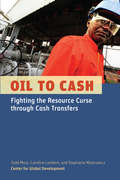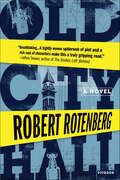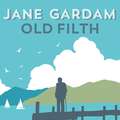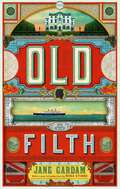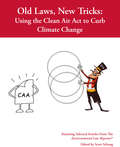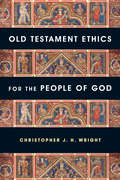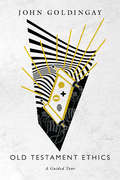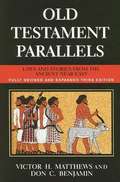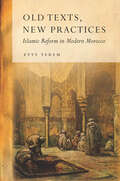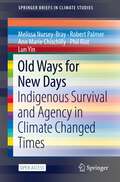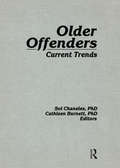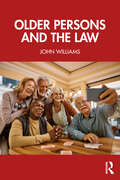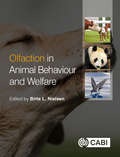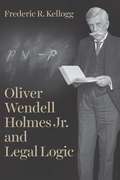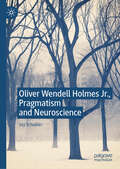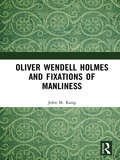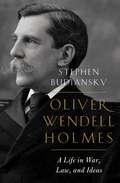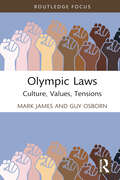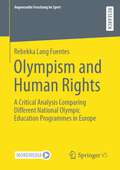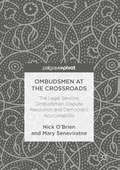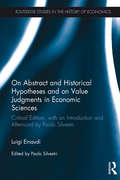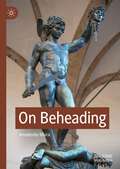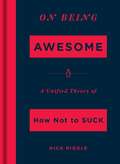- Table View
- List View
Oil to Cash: Fighting the Resource Curse Through Cash Transfers
by Caroline Lambert Todd Moss Stephanie MajerowiczWhat should a country do if it suddenly discovers oil and gas? How should it spend the subsequent cash windfall? How can it protect against corruption? How can citizens truly benefit from national wealth? With many of the world's poorest and most fragile states suddenly joining the ranks of oil and gas producers, these are pressing policy questions. Oil to Cash explores one option that may help avoid the so-called resource curse: just give the money directly to citizens. A universal, transparent, and regular cash transfer would not only provide a concrete benefit to regular people, but would also create powerful incentives for citizens to hold their government accountable. Oil to Cash details how and where this idea could work and how policymakers can learn from the experiences with cash transfers in places like Mexico, Mongolia, and Alaska.
Old City Hall: A Novel
by Robert Rotenberg"Breathtaking . . . A tightly woven spiderweb of plot and a rich cast of characters make this a truly gripping read." —Jeffery Deaver, author of The Bodies Left BehindIt should be an open–and–shut case. Canada's leading radio–show host, Kevin Brace, has confessed to killing his young wife. He had come to the door of his luxury condominium with his hands covered in blood and told the newspaper deliveryman: "I killed her." His wife's body lay in the bathtub of their suite, fatal knife wound just below the sternum.Now all that should remain is legal procedure: document the crime scene, prosecute the case, and be done with it. The trouble is, Brace refuses to talk to anyone—including his own lawyer—after muttering those incriminating words. With the discovery that the victim was actually a self-destructive alcoholic, the appearance of strange fingerprints at the crime scene, and a revealing courtroom cross-examination, the seemingly simple case begins to take on all the complexities of a hotly–contested murder trial.In the tradition of defense lawyers–turned–authors such as Scott Turow and John Grisham, Toronto-based defense counsel Robert Rotenberg delivers a debut legal thriller rich with his forensic skill. Firmly rooted in Toronto, from the ancient Don Jail to the sterile morgue and the shadowy corridors of the historic courthouse, Old City Hall takes the reader inside clattering Italian restaurants and late-night greasy spoons—and outside, to open-air skating rinks and parade-filled streets. Rotenberg leads us on a fascinating tour of a city as exciting and vital as the motley ensemble populating his story: there's Awotwe Amankwah, the only black reporter covering the crime; Judge Johnathan Summers, an old navy captain who runs his courtroom like he's still standing astride the foredeck; Edna Wingate, an eighty-three year old British war bride who just loves hot yoga; and Daniel Kennicott, a former big-firm lawyer who became a cop after his brother was murdered and the investigation hit a dead end.Douglas Preston rejoices that Rotenberg's Toronto settings "make this most multicultural city in North America come alive." Elmore Leonard has Florida; John Lescroart, San Francisco; Robert B. Parker, Boston; Scott Turow, Chicago; George Pelecanos, D.C. And now, with Old City Hall, Rotenberg offers us a page-turning legal thriller set in a diverse and surprising Toronto filled with unexpected characters and plot twists that keep you guessing until the very end.
Old Filth: Shortlisted for the Women's Prize for Fiction
by Jane Gardam'It's a cliche to compare novelists to Jane Austen, but in the case of Jane Gardam it happens to be true. Her diamond-like prose, her understanding of the human heart, her formal inventiveness and her sense of what it is to be alive - young, old, lonely, in love - never fades' Amanda Craig'I love Jane Gardam, especially Old Filth' Nina Stibbe'Her work, like Sylvia Townsend Warner's, has that appealing combination of elegance, erudition and flinty wit' Patrick Gale'One of the finest writers around. Old Filth has stayed with me for years...Can't think of anyone who achieves so much with so few words' Sathnam SangheraSir Edward Feathers has had a brilliant career, from his early days as a lawyer in Southeast Asia, where he earned the nickname Old Filth (Failed In London, Try Hong Kong) to his final working days as a respected judge at the bar. Yet through it all he has carried with him the wounds of a difficult and emotionally hollow childhood. Now an eighty-year-old widower living in comfortable seclusion in Dorset, Feathers is finally free from the demands of his work and the sentimental scaffolding that has sustained him throughout his life. He slips back into the past with ever mounting frequency and intensity, and on the tide of these vivid, lyrical musings, Feathers approaches a reckoning with his own history. Not all the old filth, it seems, can be cleaned away.Jane Gardam has written a literary masterpiece that retraces much of the twentieth century's torrid and momentous history. Feathers' childhood in Malaya during the British Empire's heyday, his schooling in pre-war England, his professional success in Southeast Asia and his return to England toward the end of the millennium, are vantage points from which the reader can observe the march forward of an eventful era and the steady progress of that man, Sir Edward Feathers, Old Filth himself, who embodies the century's fate.
Old Filth: Shortlisted for the Women's Prize for Fiction (Old Filth Trilogy Ser. #3)
by Jane Gardam'This witty modern classic is perfect lockdown reading' The Times'I love Jane Gardam, especially Old Filth' Nina Stibbe'Her work, like Sylvia Townsend Warner's, has that appealing combination of elegance, erudition and flinty wit' Patrick Gale'One of the finest writers around. Old Filth has stayed with me for years...Can't think of anyone who achieves so much with so few words' Sathnam SangheraSir Edward Feathers has had a brilliant career, from his early days as a lawyer in Southeast Asia, where he earned the nickname Old Filth (Failed In London, Try Hong Kong) to his final working days as a respected judge at the bar. Yet through it all he has carried with him the wounds of a difficult and emotionally hollow childhood. Now an eighty-year-old widower living in comfortable seclusion in Dorset, Feathers is finally free from the demands of his work and the sentimental scaffolding that has sustained him throughout his life. He slips back into the past with ever mounting frequency and intensity, and on the tide of these vivid, lyrical musings, Feathers approaches a reckoning with his own history. Not all the old filth, it seems, can be cleaned away.Jane Gardam has written a literary masterpiece that retraces much of the twentieth century's torrid and momentous history. Feathers' childhood in Malaya during the British Empire's heyday, his schooling in pre-war England, his professional success in Southeast Asia and his return to England toward the end of the millennium, are vantage points from which the reader can observe the march forward of an eventful era and the steady progress of that man, Sir Edward Feathers, Old Filth himself, who embodies the century's fate.
Old Filth: Shortlisted for the Women's Prize for Fiction (Old Filth Trilogy Ser. #3)
by Jane GardamJane Gardam's funny and wise masterpiece, reissued with a new introduction by Nina Stibbe'Old Filth has stayed with me for years' SATHNAM SANGHERA'Sharp, humane, generous and wonderfully funny' HILARY MANTEL'The last great book I read' RACHEL WEISZ 'Gardam's masterpiece'GUARDIANFilth, in his heydey, was an international lawyer with a practice in the Far East. Now, only the oldest QCs can remember that his nickname stood for Failed In London Try Hong Kong. Long ago, Old Filth was a Raj orphan - one of the many young children sent 'Home' from the East to be fostered and educated in England. Jane Gardam's novel tells his story, from his birth in what was then Malaya to the extremities of his old age. In doing so, she not only encapsulates a whole period from the glory days of the British Empire, through the Second World War, to the present and beyond, but also illuminates the complexities of the character known variously as Eddie, the Judge, Fevvers, Filth, Master of the Inner Temple, Teddy and Sir Edward Feathers.
Old Law, New Tricks: Using the Clean Air Act to Curb Climate Change
by James Salzman David M. Driesen John Doyle Michael B. Gerrard Emily Taylor Robert B. Mckinstry Jr. Brigham Daniels Timothy Profeta Robert A. Wyman Robert D. Brenner Franz Litz Marie Ly Anna Marie Wood Scott H. Segal Institute for Policy Integrity Nathan Richardson Brooks Rainey Pearson Nicholas Bianco Leila B. Azari Richard B. Herzog Arnold W. Reitze Jr. Claudine Schneider Davonne Flanagan Nicholas W. Fels Jonas Monast Charles H. Haake Patricia A. Eberwine Scott Schang Gary S. Guzy Kristin Igusky Meek The National Climate Coalition Timothy J. Mullins Natural Resources Defense Council Art Fraas John C. Dernbach Thomas D. Peterson Dallas Burtraw Hannah Polikov Delavan Dickson Raymond B. Ludwiszewski M. Rhead Enion Curtis A. Moore Rebecca Gasper Hannah ChangFew if any people think the Clean Air Act is the optimal legislative solution to climate change; but it is a powerful tool that is being used sometimes despite the prevailing political will. To address this reality, this volume calls on the best writing from the most often-cited environmental law journal in the United States, the Environmental Law Reporter®, to explain the possibilities and pitfalls in using this regulatory framework to address greenhouse gases (GHGs) and short-lived climate pollutants. This collection does not have a singular perspective or agenda other than to highlight multiple suggestions about ways in which the Act should or should not be used to address climate change. The Environmental Law Institute and editors of Environmental Law Reporter® do not endorse any approach outlined in these pages but instead present various ideas to educate and spur public debate and discussion.
Old Testament Ethics for the People of God
by Christopher J. H. WrightNothing confuses Christian ethics quite like the Old Testament. Some faithful readers struggle through its pages and conclude that they must obey its moral laws but may disregard its ceremonial and civil laws. Others abandon its teaching altogether in favor of a strictly New Testament ethic. Neither option, argues Chris Wright, gives the Old Testament its due. In this innovative approach to Old Testament ethics--fully revised, updated and expanded since its first appearance in 1983 as Living as the People of God (An Eye for an Eye in North America) and including material from Walking in the Ways of the Lord--Wright examines a theological, social and economic framework for Old Testament ethics. Then he explores a variety of themes in relation to contemporary issues: economics, the land and the poor; politics and a world of nations; law and justice; society and culture; and the way of the individual. This fresh, illuminating study provides a clear basis for a biblical ethic that is faithful to the God of both Testaments.
Old Testament Ethics: A Guided Tour
by John GoldingayWhat is ethics? Ethics is not merely about tricky situations or hot topics. Instead, ethics asks questions about what sort of people we are, how we think, what sort of things we do and don't do, and how we ought to live our everyday lives. How might we learn ethics from the Old Testament? Instead of searching for support for our positions or pointing out problems with certain passages, trusted guide John Goldingay urges us to let the Old Testament itself set the agenda. In this volume, readers will encounter what the Old Testament teaches about relationships, work, Sabbath, character, and more. Featuring Goldingay's own translation and discussion questions for group use, Old Testament Ethics: A Guided Tour is a resource for ethics like no other. Topically organized with short, stand-alone chapters, this book is one to keep close at hand.
Old Testament Parallels: Laws And Stories From The Ancient Near East, 3rd ed.
by Victor H. Matthews Don C. BenjaminA readable, portable anthology of ancient Near Eastern laws and stories that share parallel themes and issues with biblical stories. This third edition has been completely revised in light of the ongoing discoveries of more and more ancient Near Eastern texts and many of the parallels from the first two editions have been added.
Old Texts, New Practices: Islamic Reform in Modern Morocco
by Etty TeremIn 1910, al-Mahdi al-Wazzani, a prominent Moroccan Islamic scholar completed his massive compilation of Maliki fatwas. An eleven-volume set, it is the most extensive collection of fatwas written and published in the Arab Middle East during the late nineteenth and early twentieth centuries. Al-Wazzani's legal opinions addressed practical concerns and questions: What are the ethical and legal duties of Muslims residing under European rule? Is emigration from non-Muslim territory an absolute duty? Is it ethical for Muslim merchants to travel to Europe? Is it legal to consume European-manufactured goods? It was his expectation that these fatwas would help the Muslim community navigate the modern world. In considering al-Wazzani's work, this book explores the creative process of transforming Islamic law to guarantee the survival of a Muslim community in a changing world. It is the first study to treat Islamic revival and reform from discourses informed by the sociolegal concerns that shaped the daily lives of ordinary people. Etty Terem challenges conventional scholarship that presents Islamic tradition as inimical to modernity and, in so doing, provides a new framework for conceptualizing modern Islamic reform. Her innovative and insightful reorientation constructs the origins of modern Islam as firmly rooted in the messy complexity of everyday life.
Old Ways for New Days: Indigenous Survival and Agency in Climate Changed Times (SpringerBriefs in Climate Studies)
by Robert Palmer Melissa Nursey-Bray Ann Marie Chischilly Phil Rist Lun YinThis Open Access book provides a critical reflection into how indigenous cultures are attempting to adapt to climate change. Through detailed first-hand accounts, the book describes the unique challenges facing indigenous peoples in the context of climate change adaptation, governance, communication strategies, and institutional pressures. The book shows how current climate change terminologies and communication strategies often perpetuate the marginalisation of indigenous peoples and suggests that new approaches that prioritise Indigenous voices, agency and survival are required. The book first introduces readers to Indigenous peoples and their struggles related to climate change, describing the impacts of climate change on their everyday lives and the adaptation strategies currently undertaken to address them. These strategies are then detailed through case studies which focus on how Indigenous knowledge and practices have been used to respond to and cope with climate change in a variety of environments, including urban settings. The book discusses specific governance challenges facing Indigenous peoples, and presents new methods for engagement that will bridge existing communication gaps to ensure Indigenous peoples are central to the implementation of climate change adaptation measures. This book is intended for an audience of Indigenous peoples, adaptation practitioners, academics, students, policy makers and government workers.
Older Offenders: Current Trends
by Cathleen BurnettHere is the most up-to-the-minute interdisciplinary research that has been conducted on older offenders. This scholarly volume highlights the dimensions of the offenses committed by older adults and features empirical research addressing the sentencing alternatives applied to older offenders. Academicians and practitioners also provide much-needed insight into the management and correctional issues that arise with the incarceration of older offenders, including adjustment to prison life, physical and emotional health care, and rehabilitation and/or preparation of the offender for the return to life outside prison.
Older Persons and the Law
by John WilliamsThis book explores the law and legal system’s impact on older persons. As well as describing the current law primarily in England and in Wales, it highlights the pivotal role that elder law lawyers play in using law to challenge and combat ageism. Important questions are raised about whether the law perpetuates ageism and whether the current working of the law effectively challenges discrimination, abuse, and social exclusion faced by older persons.Elder law lawyers have an essential role in advocating for the rights of older persons. The book focuses on the need to uphold and respect the human rights of older persons, emphasising their dignity, autonomy, and right to inclusion. It examines key topics such as human rights in the context of ageing, the provision of social care, discrimination, decision-making capacities, mental health, and abuse and neglect. It also offers insights into the notion of personal liberty concerning older persons and whether existing safeguards are sufficient.The international dimensions of elder law are discussed, highlighting the range of initiatives led by the United Nations and efforts by non-governmental organisations and regional bodies. These initiatives aim to confront and diminish ageism on both international and domestic fronts, emphasising the need for a concerted effort to enforce the rights of older persons across different cultures and legal systems.This book will interest researchers, students, and practitioners specialising in family and social welfare law, elder law, human rights law, and discrimination law.
Olfaction in Animal Behaviour and Welfare
by Birte Lindstrøm NielsenEvidence-based, yet entirely practical, this important new text builds upon the basics of neuroscience to describe the links between olfaction and animal behaviour, and the effects of odours in animal welfare. Animals use smells in a multitude of ways: to orientate themselves, to create social bonds, to recognise food, to initiate reproduction, and to avoid predators and imminent threats such as fire. Starting from the scientific basis of olfaction and odour perception, the book covers pheromones and behavioural tests, before describing the role of olfaction in feeding behaviour, reproduction, disease detection, and animal housing. The book: #65533; is written in an evidence-based way, yet with an easy-to-understand style, making it accessible to non-experts #65533; focuses on animals managed by humans, i. e. farm, zoo, lab and companion species #65533; is illustrated by in-depth research examples of many different species This is a captivating introduction to the world of smells, suitable for advanced students, researchers, and teachers of applied ethology, animal welfare and veterinary science.
Oliver Wendell Holmes Jr. and Legal Logic
by Frederic R. KelloggWith Oliver Wendell Holmes, Jr. and Legal Logic, Frederic R. Kellogg examines the early diaries, reading, and writings of Justice Oliver Wendell Holmes, Jr. (1841–1935) to assess his contribution to both legal logic and general logical theory. Through discussions with his mentor Chauncey Wright and others, Holmes derived his theory from Francis Bacon’s empiricism, influenced by recent English debates over logic and scientific method, and Holmes’s critical response to John Stuart Mill’s 1843 A System of Logic. Conventional legal logic tends to focus on the role of judges in deciding cases. Holmes recognized input from outside the law—the importance of the social dimension of legal and logical induction: how opposing views of “many minds” may converge. Drawing on analogies from the natural sciences, Holmes came to understand law as an extended process of inquiry into recurring problems. Rather than vagueness or contradiction in the meaning or application of rules, Holmes focused on the relation of novel or unanticipated facts to an underlying and emergent social problem. Where the meaning and extension of legal terms are disputed by opposing views and practices, it is not strictly a legal uncertainty, and it is a mistake to expect that judges alone can immediately resolve the larger issue.
Oliver Wendell Holmes Jr., Pragmatism and Neuroscience
by Jay SchulkinThis book explores the cultures of philosophy and the law as they interact with neuroscience and biology, through the perspective of American jurist Oliver Wendell Holmes’ Jr., and the pragmatist tradition of John Dewey. Schulkin proposes that human problem solving and the law are tied to a naturalistic, realistic and an anthropological understanding of the human condition. The situated character of legal reasoning, given its complexity, like reasoning in neuroscience, can be notoriously fallible. Legal and scientific reasoning is to be understood within a broader context in order to emphasize both the continuity and the porous relationship between the two. Some facts of neuroscience fit easily into discussions of human experience and the law. However, it is important not to oversell neuroscience: a meeting of law and neuroscience is unlikely to prove persuasive in the courtroom any time soon. Nevertheless, as knowledge of neuroscience becomes more reliable and more easily accepted by both the larger legislative community and in the wider public, through which neuroscience filters into epistemic and judicial reliability, the two will ultimately find themselves in front of a judge. A pragmatist view of neuroscience will aid and underlie these events.
Oliver Wendell Holmes and Fixations of Manliness
by John M. KangOliver Wendell Holmes, Jr. has been, and continues to be, praised as America’s greatest judge and he is widely considered to have done more than anyone else to breathe life into the Constitution’s right of free speech, probably the most crucial right for democracy. One indeed finds among professors of constitutional law and federal judges the widespread belief that the scope of the First Amendment owes much of its incredible expansion over the last sixty years to Holmes’s judicial dissents in Abrams and Gitlow. In this book, John M. Kang offers the novel thesis that Holmes’s dissenting opinions in Abrams and Gitlow drew in part from a normative worldview structured by an idiosyncratic manliness, a manliness which was itself rooted in physical courage. In making this argument, Kang seeks to show how Holmes’s justification for the right of speech was a bid to proffer a philosophical commentary about the demands of democracy.
Oliver Wendell Holmes: A Life In War, Law, And Ideas
by Stephen BudianskyThe extraordinary story of the U.S. Supreme Court’s most influential justice. Oliver Wendell Holmes twice escaped death as a young Union officer in the Civil War when musket balls missed his heart and spinal cord by a fraction of an inch at the Battles of Ball’s Bluff and Antietam. He lived ever after with unwavering moral courage, unremitting scorn for dogma, and an insatiable intellectual curiosity. Named to the Supreme Court by Theodore Roosevelt at age sixty-one, he served for nearly three decades, writing a series of famous, eloquent, and often dissenting opinions that would prove prophetic in securing freedom of speech, protecting the rights of criminal defendants, and ending the Court’s reactionary resistance to social and economic reforms. As a pioneering legal scholar, Holmes revolutionized the understanding of common law by showing how the law always evolved to meet the changing needs of society. As an enthusiastic friend and indefatigable correspondent, he wrote thousands of personal letters brimming with humorous philosophical insights, trenchant comments on the current scene, and an abiding joy in fighting the good fight. Drawing on many previously unpublished letters and records, Stephen Budiansky’s definitive biography offers the fullest portrait yet of this pivotal American figure, whose zest for life, wit, and intellect left a profound legacy in law and Constitutional rights, and who was an inspiring example of how to lead a meaningful life in a world of uncertainty and upheaval.
Olympic Laws: Culture, Values, Tensions (Routledge Focus on Sport, Culture and Society)
by Mark James Guy OsbornOlympic Laws: Culture, Values, Tensions is the first book to analyse fully the Olympic legal framework and its application to the IOC and the Olympic Games through a socio-legal lens. It opens up a new window into understanding the Olympic Games across recent iterations of the Games and on to future Games. The book begins by defining the parameters of the emergent legal sub-fields of Sports Law, lex Olympica and Olympic Law, through the identification of the sources of these Olympic Laws and their underpinning norms. It then uses a series of case studies to demonstrate how lex Olympica has evolved as a means of defending the Olympic Movement from unwanted legal interventions, how Olympic Law has been created to protect the commercial rights vested in the Games, and how the legacies created by this unique category of law have a lasting impact on host cities and beyond. It concludes with a call that the IOC should recalibrate its relationships with prospective hosts and the participating athletes by requiring specific adherence to the Fundamental Principles of Olympism. This is essential reading for any student or researcher with an interest in Olympic studies, sports law, or socio-legal studies or any practising lawyer or events professional looking to better understand the impact and institutions of mega-events.
Olympism and Human Rights: A Critical Analysis Comparing Different National Olympic Education Programmes in Europe (Angewandte Forschung im Sport)
by Rebekka Lang FuentesOlympic Education is tasked by both Olympism (Olympic Movement’s underlying philosophy) and the United Nations to educate on human rights. This study explores how present this call is in contemporary European Olympic Education. National Olympic Education programmes from twelve countries are examined and compared: Armenia, Austria, Belarus, Croatia, Hungary, Israel, Germany, Lithuania, Portugal, Russia, Slovenia, and Spain. Responses by individuals with NOAs’ leadership positions to a semi-standardized research questionnaire as well as written information by NOAs on implemented national Olympic Education programmes, collected during February-May 2021, are subjected to a content analysis. Results indicate that human rights are explicitly and implicitly included as an educational theme in contemporary Olympic Education programmes. Parallels between human rights education and Olympic Education can be drawn.
Ombudsmen at the Crossroads
by Nick O’brien Mary SeneviratneThis book charts the evolution of the Legal Services Ombudsman for England and Wales. Established in 1990, it had a statutory remit that explicitly recognized its dual responsibility for consumer dispute resolution and democratic accountability. It was replaced in 2010 by a very different type of ombudsman institution. The book describes how the Ombudsman reconciled its different roles and how far it succeeded in changing the mentality of the legal profession. The authors relate the Ombudsman's successes and failures to current debates facing the ombudsman and regulatory community, and highlight the continuing potential of the ombudsman institution. The ombudsman institution emerges as a 'third way' between the courts and various forms of alternative dispute resolution, and as a creative and democratic means of responding to public grievance.
Ombudsmen at the Crossroads: The Legal Services Ombudsman, Dispute Resolution and Democratic Accountability
by Mary Seneviratne Nick O'BrienThis book charts the evolution of the Legal Services Ombudsman for England and Wales. Established in 1990, it had a statutory remit that explicitly recognized its dual responsibility for consumer dispute resolution and democratic accountability. It was replaced in 2010 by a very different type of ombudsman institution. The book describes how the Ombudsman reconciled its different roles and how far it succeeded in changing the mentality of the legal profession. The authors relate the Ombudsman’s successes and failures to current debates facing the ombudsman and regulatory community, and highlight the continuing potential of the ombudsman institution. The ombudsman institution emerges as a ‘third way’ between the courts and various forms of alternative dispute resolution, and as a creative and democratic means of responding to public grievance.
On Abstract and Historical Hypotheses and on Value Judgments in Economic Sciences: Critical Edition, with an Introduction and Afterword by Paolo Silvestri (Routledge Studies in the History of Economics)
by Luigi EinaudiLuigi Einaudi (1874-1961) was a leading liberal economist, economic historian and political figure. This book provides the English-speaking world with a first critical edition of Einaudi’s – hitherto unpublished – rewriting of one of his most unique and thoughtful essays. The relevance of this essay is crucial from several perspectives: history and methodology of economic thought, role of economics and its relation to other disciplines and to social values, role of economists in the public sphere, while also encompassing the discourse on man and the economist as a "whole man". The critical edition of On Abstract and Historical Hypotheses and on Value Judgments in Economic Sciences includes a comprehensive introduction and afterword. An extensive reappraisal of this newly discovered essay will help to cast light on Einaudi’s uniqueness and originality within and beyond the Italian tradition in public finance, thereby also illuminating his attempt to provide an epistemological account of his long lasting enquiry into the causes of good and bad polities. This book is of great interest to those who study economic theory and philosophy, as well as history of economic thought, public economics and legal and political philosophy.
On Beheading
by Amalendu MisraBeheading is not an uncommon undertaking. As a particularized physical violence, it has been practiced by all societies and civilizations at some point in their history. In fact, for millennia public beheadings around the world were routine. In contemporary international society some states and many non-state actors regularly engage in this undertaking.This begs the obvious question: why put a human being through this unimaginable cruelty? While the idea of execution by decapitation appears visceral and horrific, it has always been grounded in cultural, religious and political contexts. If contemporary history is any proof, the enterprise of beheading a fellow human being appears to be making a comeback in certain religious and political landscapes.A question of enormous intellectual importance, the phenomenon of beheading is understudied. There have been many explanations surrounding specific forms of beheading through the ages. However, no inclusive study has engaged with it in its entirety.Primarily a philosophical reflection, On Beheading is inter-disciplinary in nature; it freely cuts across various disciplines within the broad framework of the social sciences. It uses a vast array of empirical evidence from anthropology, literature, jurisprudence and religion to build a discourse and narrative that brings this subject under one intellectual umbrella.
On Being Awesome: A Unified Theory of How Not to Suck
by Nick RiggleIn this lively treatise, pro-skater-turned-philosopher Nick Riggle presents a theory of awesomeness (and its opposite, suckiness) that’s both sharply illuminating and more timely than ever “Nick Riggle’s fun book is ‘awesome’ by its own definition. But don’t miss its profound ambition, which is to show how philosophy unearths the structure of ordinary language, defines the meaning of life in routine business, and poses the question of how best to live.” —Aaron James, author of Assholes: A Theory We all know people who are awesome and people who suck, but what do we really mean by these terms? Have you ever been chill or game? Do you rock or rule? If so, then you’re tapped into the ethics of awesomeness. Awesome people excel at creating social openings that encourage expressions of individuality and create community. And if you’re a cheapskate, self-promoter, killjoy, or douchebag, you’re the type of person who shuts social openings down. Put more simply: You suck. From street art to folk singers, Proust to the great etiquette writer Emily Post, President Obama to former Los Angeles Dodger Glenn Burke, Riggle draws on pop culture, politics, history, and sports to explore the origins of awesome, and delves into the nuances of what it means to suck and why it’s so important to strive for awesomeness. An accessible and entertaining lens for navigating the ethics of our time, On Being Awesome provides a new and inspiring framework for understanding ourselves and creating meaningful connections in our everyday lives.
